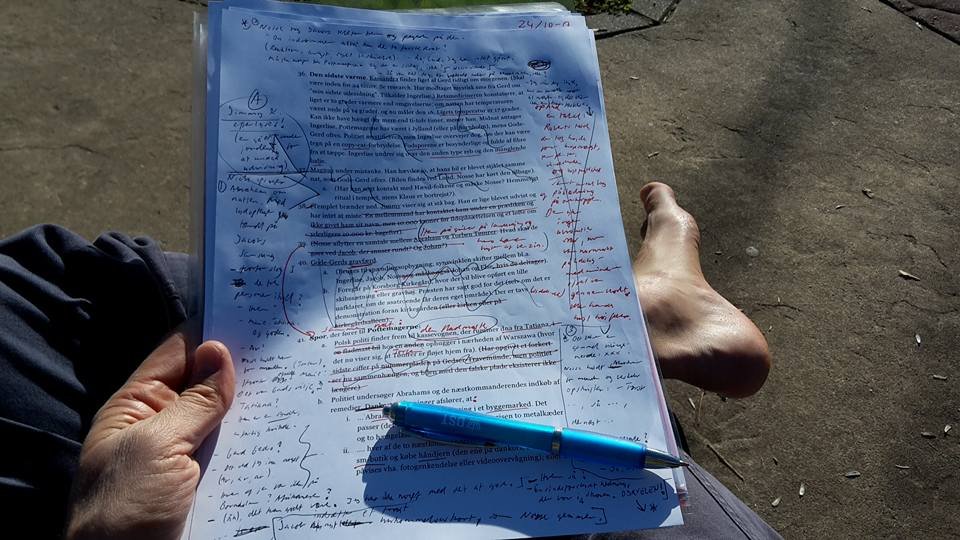Killing Your Darlings (and other good advice when you want to write a book)
You want to write a book, but it turns out not to be so easy as you thought. This article will give you some good advice – and lead you on to more advice. Writing can be hard work. Meanwhile, don’t kill your spouse.
Let’s say you always wanted to write a book. Let’s say you didn’t have the time. Until now.
Well, you get started. You write five pages, ten pages, even 20 pages. You feel inspired. You just began your new dual career. You are going to spend the next two years in Ulan Bator, the Mongolian capital that you honestly didn’t know anything about just six months ago. Now you have lots of time.
Then comes the doubt. Well, doubt is part of life – you realised that long ago, of course. But. The doubt is sneaking into your brain.
Next day you sit down in the morning. Your spouse has gone to work. You have had coffee, and then some more coffee. Now it is time to write. But. Well, as nothing happens in front of the computer (apart from thee-mails, posts, chats, newsletters and news you read), you decide to go for a walk, re-considering your book project. Will ANYbody EVER want to read YOUR book? Why should they? What do you have to contribute? There are so many other clever and brilliantly written novels and non-fiction books. You don’t even have time yourself to read them, not even now in your supposedly quite relaxing two years in Mongolia where you don’t know anyone else, apart from a friend of a friend who has left the country some time ago.
Will you ever again find the inspiration that kept you going the first week? Are you at all able to write a whole book, to sit down and concentrate? Are you willing to risk the refusals of professional publishers – or in the case of getting through this small gate eventually receiving public critique, surely in the form of negative reviews, pinpointing your errors and lack of eloquence and genuine new ideas?
There is help out there
It’s normal to have doubts, both when you are in the middle of a career transition, when you start a new project, and when you try to realise and old, or new, dream. If you want to write a book – which is, of course, not the only nor necessarily the best way to spend a possibly important and comfortable period of your life in a fascinating new country – luckily there is help to be found.
I can think of three methods, apart from asking for advice in your own network of experienced people:
Read one or two books about writing; be specific, and choose a book about writing novels/non-fiction/travel book/academic literature/a children’s book etc.
Appoint yourself to a (creative) writing course; should be specific in regard to your area of interest, e.g. fiction.
Contact a professional writer or (creative) writing teacher who offers individual advice and feedback; or if you have a finished manuscript, this expert can help you as an editor, improving your chances of success.
Get professional sparring and individual advice
I am a full time writer myself, offering the third possibility, author help. I have published both novels, short stories, essays, and a non-fiction book, and I hold an MA in Comparative Literature. I grew up with lots of books at home, and I already started writing as a teenager.
When I was 27 years old, I published my first book, a reportage from South America. This book and my academic title paved the way to a job as a creative writing teacher, but I was nearly 40 years old when I managed to publish my first novel, a detective story. So I can tell you, it isn’t easy to get through with your dream, if you share the dream of becoming a writer.
If you contact me, or some other professional expert, he, she or I will always take you serious. We understand your doubt and all that.You can contacts us at any point, the earlier in the process, the better.
If you have already written 300 pages, it is also fine, butyou may be a bit reluctant to change it all, just because I suggest it. Anyway, first you send me a synopsis and a chapter or so.
If you have just started, or are planning to start, let’s discuss your idea. The genre. The possibilities. The time schedule (you say you are two years in Ulan Bator). The next steps; I will probably ask you to send me a short presentation of your idea and a little bit of text when you have produced it. You may be very good at talking and not so good at writing. Or the reverse. In the end, the text should do the talk.
We have to find out what kind of book it is. Normally, it is easy. It’s a novel, a collection of short stories, an essay based on your professional experiences, a guide book or whatever.
Which genre & why at all a book?
But there may be alternatives to the genre you suggest: Have you considered a drama script, a biography (in stead of fictionalising your very bad experiences with your famous, but violent father who skipped your mother when she was pregnant, then came back, then found another one, then started to drink while he was earning his fortune), or a travel book from Mongolia (instead of an encyclopedic book based on geographical science)?
And we shouldn’t forget the basic question about purpose:What is the purpose of writing the book?
Think about one last thing before you start or go on withyour project: Might there be more career possibilities or money or fun inwriting a blog, giving lectures at the local university or making The Weekly UlanBator Podcast? Why do you absolutely want it to become a book?
Show it, kill it – and a few other tricks
If you insist on a book, or if we agree that a book makes sense, then come the next steps. You have to sit down and write. Believe in yourself, keep going, concentrate, focus. Tell your happy spouse not to disturb you, not to ask you to do all the things a housewife or a househusband usually does during day time.
Here I will shortly give you some advice for the writing process, some of it mostly for writing fiction, some of it for writing other genres. But remember, especially for artistic writing: There are no rules, only rules of thumb. Don’t listen too carefully to all the clever, experienced people, not even me!
Mostly for fiction:
Show it, don’t tell it. Write like a camera. Don’t write, ”She was working hard.” Show it, e.g. this way: ”Every morning she got up at 4:30. She had a glass of water and a slice of bread, then walked the 8,5 kilometers to the poor area of the old hospital outside Ulan Bator. She entered the little dark restaurant to the left of the cancer patients’ entrance and washed dishes for the next ten hours. At noon she would have her lunch break, 12 minutes, 6 slices of bread with ...” etc.
Remember all five senses: Sight, smell, hearing, taste and touch. But don’t overdo it, as some writers do, often regarding food descriptions.
Especially for plot-based fiction (crime fiction, thrillers and that stuff) try to write (a draft for) the end very early in the process. To put it simple, if you don’t know where you are heading, you won’t get there.
Mostly non-fiction:
Put. Multiple. Periods. In. Your. Looooong sentences.
Think of the recipient, the target audience. Do they understand all your (academic) expressions? Let’s say you’re a physicist, and you are of course quite a clever one, but you want to sell your book, maybe not in the market place of Ulan Bator, but to a broad audience, ranging from the interested public to first and second year students of science. Then you should find a way of dissemination that can be understood by all of these. People are not stupid, just because they didn’t study as much physics as you. But you must explain yourself – or reconsider your target audience.
Think of the ladder of abstraction, and climb down to the lowest possible level: Food -> Vegetables -> Carrots and potatoes. (In fiction you may describe these vegetables in details, but take care only to do it if it is relevant and doesn’t slow down the speed of narration too much).
Only university academics tend to put the conclusion in the last chapter. Catch the reader from the beginning – use the tricks from the narrative genres, writing scenes (show it), making suspense, having characters with whom to identify, creating contrasts.
All books:
Always have a note booklet beside your bed. Many of your best ideas will occur when you are falling asleep, or even when you are asleep. Write them down as soon as possible, before you forget them. (I often do it without turning on the light in order not to disturb my sleep too much).
Hemingway’s trick: ”When you are going good, stop writing.” Stop writing before finishing the paragraph or even the phrase you are about to complete. It makes it much easier to start next day. Especially if you have a tendency to a writer’s block, or just if you are a slow starter. Alternatively, do some warm up, writing on your computer without turning it on. Write non-stop for five minutes, whatever comes to your mind. Let the fingers do the work.
Speaking of fingers, there are other methods of ”writing” than typing. Consider using your smart phone’s voice recorder; then you can walk in the park, sit in a car or lie down with closed eyes while you are working. Or use a speech to text app, and see if it works for you.
Kill your darling. Well, you might already have thought about that. You easily fall in love. There are temptations out there. And there is the mirror, the Narcissism – you simply fall in love with your own text, your metaphor, your side stories, your eloquence. Fine, when you write your first draft. Don’t censor yourself at that point. Then, in the hard work of editing your text, when something sticks out, is too much, you doubt about it, or one of your readers – maybe your busy spouse – tells you itdoesn’t work, then kill your darling. Don’t kill your spouse, not even in UlanBator.
Written by Rune Stefansson. Writer and freelance journalist, born in Copenhagen 1971.
Rune Stefansson holds an MA in Comparative Literature and has worked as a creative writing teacher as well as a communication officer for Statistics Denmark. He has published six books, mostly crime fiction.
He lives in Bilbao on a permanent basis and is a Key Resource Person for the here we are global community. He offers help to both new and experienced writers, both as freelance editor and as adviser, and apart from the Scandinavian languages he speaks English, Spanish and German.
See more at www.runestefansson.dk/english.


